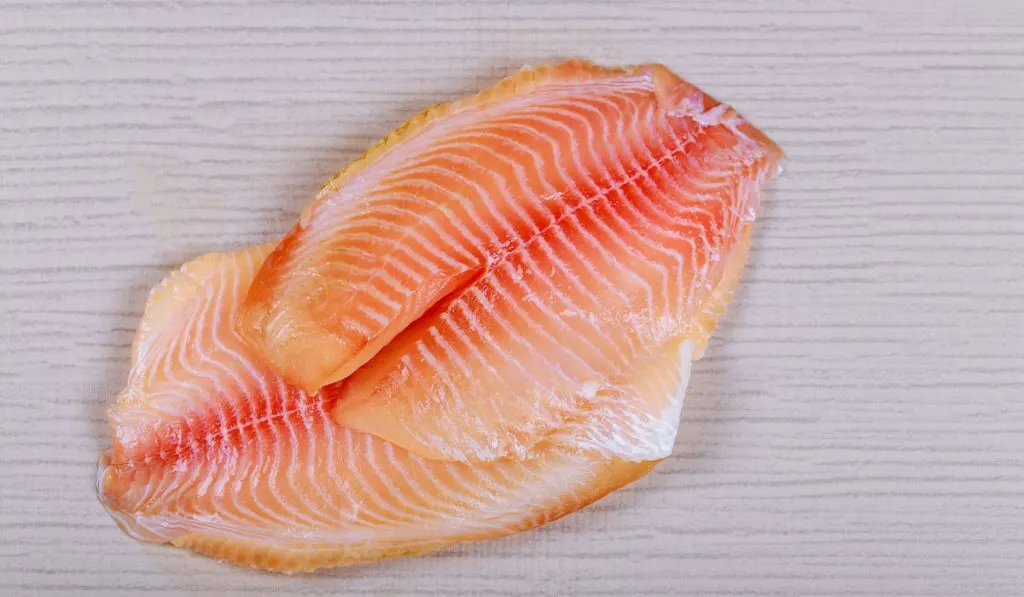One type of nutrient that is vital to the diet of a hedgehog is protein.
Hedgehogs need significant amounts of protein in their diet. However, they do not need just any type of protein; they need lean protein.
There are many sources of lean protein, including liver, chicken, kidney, and fish. But of these options, is fish okay for hedgehogs?
Can hedgehogs eat fish? While fish offers lean protein, some experts advise against feeding it to hedgehogs.

However, this is not a conclusion on the safety of feeding fish to hedgehogs.
It appears that hedgehogs can eat fish safely. But it may cause them to produce smellier poop.
So, should you give your hedgehog fish? Well, in the rest of this article, we offer insight that can guide your decision.
Can Hedgehogs Eat Fish?
The recommendations on the consumption of fish in hedgehogs are inconsistent.
Some people advise against feeding fish to hedgehogs. But others believe it is safe to consume in moderate amounts.
The recommendations against hedgehog consumption of fish may stem from the fact that fish is not part of a hedgehog’s natural diet.
However, so far, it appears that fish poses no threat to the health or nutrition of hedgehogs.
There might be different individual preferences for fish amongst hedgehogs – some may like it, and some may avoid it.
But generally, they can eat it.
While fish is safe, it is often said that it may cause hedgehogs to produce smellier poop.
This phenomenon is common when hedgehogs consume a lot of fish at once.
Historically, people thought this occurrence meant hedgehogs could not digest fish. But as we now know, this is untrue.
Hedgehogs should only be given cooked fish.
The fish should not be prepared with any additive, salt, or oil. Giving hedgehogs seasoned fish leaves them at risk of having digestive issues.
Also, feeding raw fish to hedgehogs leaves them at risk of foodborne illnesses. They may suffer a Salmonella infection or a Vibrio vulnificus infection.
You should also ensure they consume the fish in moderate amounts. Consuming too much at once may impair their digestion.

What Type of Fish Can Hedgehogs Eat?
The foremost requirement of a hedgehog diet is that it must be high protein and low in fat. So, when choosing the type of fish to feed your hedgehog, keep this in mind.
Going by the recommendation above, hedgehogs can eat the following types of fish:
- Yellowtail Fish – this fish contains 23% protein and 7% fat.
- Tuna – tuna contains 28% protein and 2% fat.
- Coho Salmon – cooked, coho salmon contains 24% protein and 8% fat.
- Tilapia – contains 26% protein and 3% fat.
- Anchovy – contains 29% protein and 10% fat.
There are many other types of fish hedgehogs can eat. All you have to do is confirm their protein and fat content.
Generally, the fish should have low fat (no more than 15%) and high protein (at least 20%).
Nutrition Facts
Generally, fish contains the following nutrients:
- Omega-3 fatty acids – This can help modulate inflammation, thus preventing heart diseases and arthritis.
- Sodium – This is a mineral that is vital to electrolyte balance. It may also be involved in nerve and muscle transmission.
- Protein – This provides amino acids – the building blocks of many parts of a hedgehog’s body. These parts include quill, nails, hair, skin, and many more.
- B-vitamins – Some of the B-vitamins in fishes are thiamin and riboflavin. Some fishes also contain pyridoxine and cobalamin. B-vitamins facilitate various metabolic processes in the body. They are also vital for nerve, heart, and muscle functions.
- Potassium – Alongside sodium, potassium helps maintain electrolyte balance in the body.
Dangers of Eating Fish
The consumption of fish by hedgehogs is not without its possible risks. But once you are aware of them, you should be able to avoid them for your hedgie.
If you feed fish to your hedgehog, ensure you get all the bones out.
Leaving the bones in may leave your hedgie at risk of choking. Also, the bones may pierce the hedgehog’s gum, leading to pains and infection.
Many animals are susceptible to mercury poisoning, and hedgehogs may be at risk too.
Many types of fish contain varying amounts of mercury. So, if your hedgie consumes excessive amounts of fish, it may be affected.
Mercury accumulates in some tissues of the body, like the brain and the kidney.

In a pregnant animal, mercury may also buildup in the fetus. Then after accumulating for a while, it starts to elicit its toxic effects. To avoid this, do not let your hedgehog consume fish regularly.
In cats, the maximum amount of mercury tolerable is 267 nanograms per gram of food. For reproducing cats, the limit is lower – 67 nanograms per gram of food.
Considering how small hedgies are compared to cats, the maximum amount of mercury they can tolerate will be way less than that of cats.
So, you should be watchful of how much fish they eat and how often they eat it.
You should also opt for fishes with lower levels of mercury, like salmons, anchovies, and tilapia.
One consequence of mercury poisoning is irreversible nerve damage. Mercury poisoning may also cause skin diseases, kidney diseases, and gastrointestinal impairment.
If your hedgehog suffers from mercury poisoning, you may notice the following symptoms:
- Blindness
- Convulsions
- Tremor
- Poor Coordination
- Bloody Urine
- Increased Thirst
- Lack of Urination
- Reduced Appetite
- Vomiting
- Diarrhea
If you notice any of the symptoms above, get the hedgie (or any other animal) to a vet clinic immediately. If left untreated, mercury poisoning will lead to death in a short time.
Types of Meat Hedgehogs Should Not Eat
Since they are omnivores, meat is a normal part of a hedgehog’s diet.
However, not all types of meat are okay for hedgehogs. Some types of meat hedgehogs should not eat include:
- Raw meat – this leaves hedgehogs at risk of an infection like salmonella.
- Seasoned meat – seasonings are usually not safe for hedgehogs.
- Fried meat – fried meat contains oil. Oil should not be used when cooking for hedgehogs.
- Red meat – red meat contains high levels of saturated fat, which is bad for hedgehogs.
Things to Remember
- Only give your hedgehog fish in moderate amounts.
- Do not give your hedgehog fish regularly.
- Ensure you remove all the bones before offering the fish to your hedgehog.
- Only give your hedgehog cooked fish. But do not cook the fish with salt, oil, or any other ingredient.
Resources
- https://www.exoticdirect.co.uk/news/what-can-pygmy-hedgehogs-eat-best-diet-your-pet-hedgehog
- https://www.hedgehogcentral.com/threads/why-is-fish-bad-for-hedgehogs.140626/
- https://www.reddit.com/r/Hedgehog/comments/26ubsp/can_hedgehogs_eat_cat_food_with_fish_in_it/
- https://www.hedgehogcare101.com/hedgehog-food-list/
- https://www.pricklesandpaws.org/feeding-wild-hedgehogs
- https://www.hedgehogcentral.com/threads/why-is-fish-bad-for-hedgehogs.140626/
- https://www.arkwildlife.co.uk/blog/what-to-feed-hedgehogs/
- https://www.menshealth.com/nutrition/a27150227/protein-in-fish/
- https://www.nutritionvalue.org/Fish%2C_raw%2C_mixed_species%2C_yellowtail_nutritional_value.html
- https://www.thesprucepets.com/feeding-hedgehogs-cat-food-1239061
- https://yarmouthvetcenter.com/hedgehog-nutrition-and-feeding.pml
- https://www.eatright.org/homefoodsafety/safety-tips/food/is-raw-seafood-safe-to-eat
- https://wholey.com/fish-nutrition-facts/
- https://lafeber.com/vet/omega-3-fatty-acids-information-for-the-veterinary-health-professional/
- https://www.healthline.com/nutrition/vitamin-b-foods
- https://www.webmd.com/diet/foods-high-in-b-vitamins
- https://fdc.nal.usda.gov/
- https://www.unr.edu/nevada-today/blogs/2018/mercury-in-pet-food
- https://www.msdvetmanual.com/toxicology/mercury-poisoning/overview-of-mercury-poisoning
- https://www.verywellfit.com/the-best-types-of-fish-for-health-2223830
